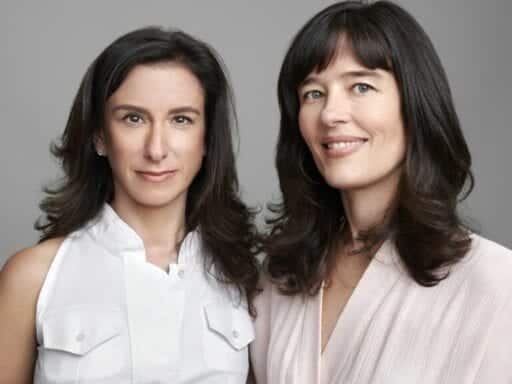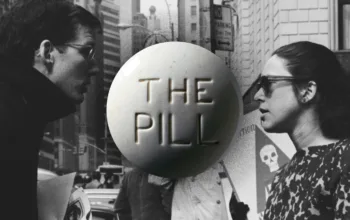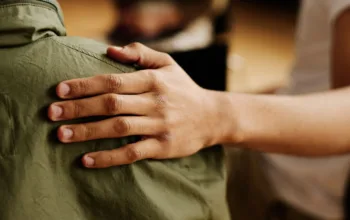Jodi Kantor and Megan Twohey talk to Vox about their new book, the women who came forward, and #MeToo today.
On January 16, 2019, 12 women got together for a meal in Los Angeles.
They were actresses, a professor, a former political candidate, a McDonald’s worker. What they had in common was that each had a story of experiencing sexual misconduct, often committed by a powerful man.
New York Times reporters Jodi Kantor and Megan Twohey chronicle this gathering near the end of their new book, She Said: Breaking the Sexual Harassment Story That Helped Ignite a Movement. They brought together the group — which included Gwyneth Paltrow, Christine Blasey Ford, and Rachel Crooks, among others — to answer a question about the #MeToo movement: “What happened to women who spoke up, and what did they make of everything that had transpired?”
As Kantor and Twohey note, #MeToo was founded more than 10 years ago by activist Tarana Burke. But the two Times reporters helped kick off the movement’s current, most public phase with their October 2017 story on sexual harassment allegations against producer Harvey Weinstein — and the payoffs he’d organized to keep those allegations secret.
Their initial story led to more coverage of sexual misconduct in Hollywood and elsewhere, and a Pulitzer Prize in 2018. It also led many more women to come forward about Weinstein, and other powerful people, beginning a nationwide reckoning around the issue of sexual misconduct that continues to this day.
In their book, Kantor and Twohey write about the process of reporting the Weinstein story, and include new interviews with Weinstein associates — including the producer’s brother, Bob Weinstein — that shed light on how he was able to avoid consequences for so long. But they also spend time on the women who came forward, and what that decision has meant for their lives.
At the January gathering, many survivors talked about the costs of speaking out, from online harassment to the experience of having one’s entire identity reduced to the phrase “Trump accuser.” But they also spoke of their own resilience: “We walked through the fire, but we all came out the other side,” said Zelda Perkins, a former Weinstein employee turned activist.
American society as a whole is still, in some ways, walking through the fire of the #MeToo movement — debate continues to rage about its proper scope, systemic change can seem far-off, and some of the most powerful people accused, including President Trump, have yet to face consequences. It’s not clear when, if ever, we will come out the other side of all this.
But the voices of the people who first spoke up, and the reporters who brought their stories to the world, can help guide us along the way. I spoke to Kantor and Twohey by phone about their reporting on Weinstein, their interviews with Ford after she testified during Supreme Court Justice Brett Kavanaugh’s confirmation process last year, and their thoughts on the future of #MeToo. Our conversation has been condensed and edited.
Anna North
What do you think it was about the Weinstein story that brought the #MeToo movement to a new place, when previous stories about sexual misconduct allegations against Bill O’Reilly and others at Fox News hadn’t necessarily? Or were those laying the groundwork for the movement to slowly build?
Jodi Kantor
Those stories had massive impact. To us, the O’Reilly story was a revelation. I know it was many, many, many sexual harassment stories ago, but if you go back to that time, the idea that a man that powerful could lose his post because of public exposure of these claims, which Fox had already known about — it really felt like an exception to the rule, or a reversal, because for so long men who had had serious accusations made against them had prevailed, whether we’re speaking about Clarence Thomas or Bill Clinton.
But that question of how did the Weinstein story become this kind of solvent for secrecy is a big part of why we wanted to write this book. Because once we saw the staggering effect that the story had had, of course combined with a lot of people’s other hard work, we felt we needed to more fully understand the answers to the questions that the Weinstein story was raising. And there’s so many of them.
For example, we tell the story of two very fraught years in the life of the Weinstein Company, and how internally to the top leadership, these allegations were becoming more visible, and things were happening every few months that were extremely alarming. And yet the company ultimately failed to act.
And so the question we wanted to answer was, “How can a company become so complicit in abuse?” That’s not just a question for the Weinstein Company, it’s a question for any of us. If we see wrongdoing in the workplace, what do any of us do about it?
Anna North
At one point in the book you write this powerful line about Weinstein: “No one had ever stopped this man.” And I think some of the most fascinating and disturbing revelations of the #MeToo movement have been about people who knew about allegations and didn’t do anything. Can you talk a little bit about the role of internal enabling in the Weinstein story, and what it says about abuses of power at companies more generally?
Megan Twohey
We really wanted to press into the Weinstein Company, and try to figure out who knew what when, and what they tried to do about it. So we really zoom in on three figures: Irwin Reiter, who was a longtime accountant in Weinstein’s companies, first at Miramax and then at the Weinstein Company; Lance Maerov, who was one of the more active members of the board; and Bob Weinstein, Harvey’s own brother and longtime business partner.
These were three men, three central figures in the company who all became increasingly concerned about Harvey’s behavior. Irwin Reiter, especially in 2014 and 2015, had glimpsed enough allegations against his boss and heard enough to believe that he was starting to pose a real danger to women.
He’s also worried that Weinstein could basically be revealed to be a Bill Cosby-type figure, and thereby destroy the company. Lance Maerov was also made aware of allegations against Weinstein, as was Bob. And in the case of Bob Weinstein, that had been really one of the more pressing questions, “What did his own brother know and when did he know it, and what did he try to do about it?”
For the first time, in this book, he opens up and shares his perspective. It took us a long time to get him to talk. But ultimately he did open up to us, and admit that he was aware of allegations of sexual misconduct against his brother going back to the 1990s. In a couple of cases, he provided money to silence the women who came forward. But that he also, like so many people in Weinstein’s orbit, believed Harvey when he claimed that these were all extramarital affairs and nothing more.
He also applied a rationale that was rooted in his own personal battles with and recovery from substance abuse. He chose to believe that his brother suffered from sex addiction. As part of our reporting, he provided to us this letter that he wrote to Harvey in 2015, pleading with him to get treatment for “misbehavior.”
We reproduce that letter in its entirety in the book, because we wanted to give readers a chance to see for themselves, and read for themselves what Harvey’s own brother was saying to him in 2015, two years before all of the allegations spilled into public view. And to contemplate the question of, when any of us get glimpses of wrongdoing, how do we try to stop it? And how is it that we’re able to become complicit in abuse?
Anna North
I also want to ask about how it felt to be working on this story, as reporters. Harvey Weinstein had a reputation for threatening people. Ronan Farrow has reported that he tried to use investigative tactics against journalists. Was this story scary to work on?
Jodi Kantor
We were much more worried about our sources than we were about ourselves. Take someone like Laura Madden, who was, along with Ashley Judd, one of the two first women to go on the record against Weinstein. And Laura Madden is not famous, she doesn’t have extraordinary resources. She is a former Weinstein assistant. She lives in Swansea, Wales, and she was at a very vulnerable point in her life when we were speaking to her. It just so happened that we found her, she had just been divorced, and she had been treated for breast cancer. And she needed additional surgery.
We were trying to persuade her to go on the record. And to our horror, basically, we realized that the publication of the story was going to more or less coincide with her surgery date. And here so many people hadn’t answered our calls, or were scared to go on the record. And Laura was not only willing to do it, but willing to do it at that very moment in her life.
We were very worried about what kind of threats or intimidation could come her way. We were much less worried about ourselves. We’re investigative journalists, we’re trained to do this. We kind of relish the idea of confronting powerful people about wrongdoing.
I’d say our fear was fear of failure. We were scared of not getting the story. We were scared of messing up the story.
Anna North
One of the most powerful parts of the book, is the description of the group interview, where you brought women together to talk, in most cases long after they’d gone public. Can you talk a little bit about what came out at that interview, and what the fallout, positive and negative, has been in these women’s lives of the public testimony that they chose to give?
Jodi Kantor
To end the book, we did something pretty unusual. We had a group interview with women who had accused Donald Trump, Harvey Weinstein, and Brett Kavanaugh of sexual abuse. And also we were joined by a McDonald’s worker, Kim Lawson, who is pushing for the company to have stronger policies about sexual harassment in the workplace.
We did it because we wanted to address the question of what life was like on the other side. These women had all really deliberated about coming forward. And it’s such a hard decision, that’s part of why the book is called She Said. It’s so unfair in so many ways that it’s women who have to do this work. None of these women did anything to get harassed or assaulted. And we wanted to know how they felt about their own decisions.
The strongest common theme is that it was transformational for many of them, but not in the ways that they had necessarily expected.
What people in the room really had in common is that they had each told a very personal story from their past that ended up having a gigantic impact, more than any of them ever could have imagined. Ashley Judd was there, and Ashley really put her career on the line to tell the truth about Weinstein. And, lo and behold, she was treated by the culture as a hero. She’s got this great new appointment at the Kennedy School, people thanked her on the street. Shortly after the story was published, she was getting off an airplane, and there was a line of people waiting to thank her.
But then if you look at Rachel Crooks, who came forward [with an allegation against Donald Trump] in 2016 — she’s had a really interesting mixed experience. She says, “It has opened doors and provided me with this new path, but it also ties me to this awful human being.”
She was invited to run for office in part because of her experience coming forward, but she happened to lose. And here it was two years later after making this public accusation, and she was still feeling out all of the ways in which coming forward had affected her life, for good and ill.
Anna North
One of the people who was there was Christine Blasey Ford, and I know that you’ve had some pretty rare conversations with her. She hasn’t, for understandable reasons, done very many interviews since the Kavanaugh hearings.
And she’s still getting pushback — you probably saw the recent Federalist story making the case that her testimony was politically motivated. Can you talk a little bit about your conversations with her? What should readers know about her story both before and after coming forward?
Megan Twohey
We conducted the first interview of Christine after the hearing, and in the course of many months spoke to her for dozens of hours about her experience. When I first caught up with her in Palo Alto in December, just a couple months after the hearing, she showed up to breakfast with a baseball hat pulled down. She had not yet moved back into her home. She was still basically in hiding.
She was, I think, on the one hand really rattled by some of the negative, harsh impact [the Kavanaugh hearing] had had on her life. On the other hand, she had been flooded with tens of thousands of letters from people who had written to her with their own stories of sexual assault, of abuse. And also just praise for her courage to step forward and testify in such a public manner.
So many people watched her testimony and either saw her as a hero of the #MeToo movement, or as a villain. And once we were able to piece together the behind-the-scenes story of her private path to testifying, we realized it was so much more complicated than either side knew.
When it first came out that he was on the shortlist, one of the things that she contemplated was actually calling Kavanaugh and saying, “Why don’t we spare our families the toll it would take if I had to move forward reporting this.”
That was just one of the many surprising fits and starts to her coming forward. This was a private citizen who felt like she had information that was going to be important that she just wanted to report to the people who are going to be considering this man for one of the highest offices in the land.
Anna North
There’s been pushback on #MeToo almost from the beginning — not as much about Weinstein specifically, but around Aziz Ansari, and certainly around Sen. Al Franken. I’m curious how you think about that as journalists, and how you’ve seen the way people talk about #MeToo evolve over the past couple of years.
Jodi Kantor
What we see in our reporting is that there are three questions about #MeToo that remain really unresolved. The first is, what is the scope of behaviors that we’re looking at? Is it just very serious allegations of sexual assault and rape? Is it Aziz Ansari-like situations of uncomfortable dates? Is it bra-snapping in high school hallways?
Number two is how do we get to the bottom of what really happened? What are the tools we use to ascertain the truth?
And then number three is, how should accountability and punishment work? I think in both of the cases that you just mentioned, it feels like all three questions are unresolved. And they also get blurred together.
There’s a lot of genuine moral confusion out there. We think that it’s going to be hard to make progress until all of us collectively can try to clarify those three questions.
But in the meantime, you also can’t solve a problem that you can’t see fully. So, much of the reporting not just Megan and I, but so many other journalists at publications across the country and across the world, have done is just about seeing the problem clearly, and uncovering these incidents. We feel like the contribution we can make is to continue to uncover the facts.
Anna North
My last question is a complicated one, but what do you see as having been the movement’s impact in the last two years? What’s been the impact of your reporting, and also more generally of people coming forward to talk about sexual misconduct?
Megan Twohey
Jodi and I have been among the reporters who have seen time and again how scared women have been to come forward with their stories of sexual harassment and sexual assault. Not just in the Weinstein case, but beyond.
And there was a moment about two weeks after the Harvey Weinstein story broke. We had been continuing to work around the clock on our reporting, but I came home one night at around 10, and I flipped open my laptop, and I clicked on my Facebook page for the first time in week. And it was the first time that I saw the #MeToo hashtag really taking off in earnest. And to see colleagues, and friends, and family members stepping forward with their own stories, going public with their own stories of abuse, or harassment, or sexual assault, it really did feel like the dam was breaking.
I cried. It was so moving to see. Listen, there’s no question that we have not seen the type of systemic reform that both accusers and the accused want, to make sure that everybody is adequately protected. There’s still clearly a lot of work to do, but to just see the silence shattered — I don’t think that we can understate the significance of that.
Author: Anna North
Read More



